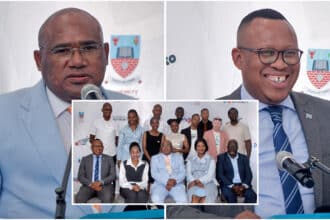Despite setting itself a steep target for the second-quarter of the financial year, Botswana Unified Revenue Services (BURS) have exceeded their own loft expectations.
Between July and September, the tax collectors raked in an incredible P23.851 billion as they make huge strides towards their overall annual goal of P46 billion.
Speaking to the media last Wednesday, BURS Commissioner General, Jeanette Makgolo explained they had been seeking P23.217 billion from the three-month period and were delighted with the unexpected extra millions.
Putting the figure into context, Makgolo noted this was 38.1 percent more (P6.571 billion) than the revenue service managed to raise over the corresponding period last year.
The collection mostly comes from Value Added Tax (VAT), income tax and customs and excise duties.
Commending her workforce for pulling out all the stops, The BURS boss said, “The performance is not a windfall but a product of hard work and commitment in addressing performance gaps and responding to the current business challenges. It is always going to be our major priority to raise adequate funding for national priorities.”
Going forward, Makgolo revealed a high-tech digital marking and tracking solution for excisable goods was in the pipeline.
The project was influenced by an influx in smuggling of excisable products, particularly alcohol, brought about by high duties and levies.
With counterfeit booze said to be flooding the market, BURS were struggling to establish what was manufactured locally and what was snuck into Botswana illegally.
“This program, once fully implemented, will be transformational for Batswana and help support excise revenue collections, benefitting all citizens and compliant industry players alike. It is expected to ensure that legitimate duties and levies are paid on all imported and manufactured products and provide a fair and level field for all manufacturers, importers and traders while protecting consumers from often harmful and substandard illicit smuggled goods,” stated Makgolo.
She is confident this process of electronic billing will further minimize VAT fraud.
“This will surely improve efficiency of collection of VAT, benchmarking has already been done in Rwanda, Tanzania and Uganda,” Makgolo declared.
Meanwhile, in other tax-related developments, BURS has extended the filling season to 31 December.
Initially, the deadline was set for 30 September.
However, with compliance rate sitting at just 43 percent by the time the window closed it was moved back to the end of the year. At the moment, out of the 65, 000 tax-payers expected to file, only 27, 749 had completed their returns.







